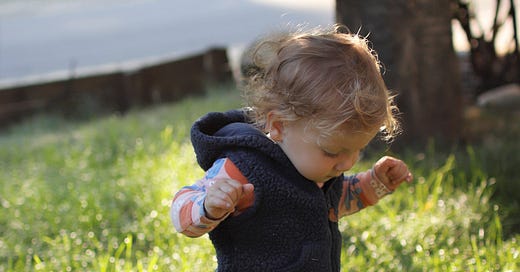Julia and I stood watching Bobbie toddle about the kitchen, waving her popsicle with exuberance. She gained speed for a moment and then toppled to the ground. With only a momentary grunt of frustration, she got her feet underneath herself, pushed backward with her hands into a squatting position, and then stood up. It was an astounding display of both physical and emotional competence.
If you’ve spent a good amount of time with babies you’ll appreciate just how remarkable learning basic functionality is. In a subversion of expectation, it is not the big things like walking and running that defy understanding. We easily comprehend that complex behaviors are the result of small iterative steps of improvement. What defies intuitive comprehension is spanning the distance between not knowing how to say “Mama” and saying “Mama”. It is the leap between not knowing to knowing, whether that applies to language, concepts, actions, or spatial awareness. Once the basic functions are in place it is obvious how more complex ones are mastered.
It is as if knowledge about self and the world emerges out of the ether. Suddenly, Bobbie knows what a “kitty” is, and can recognize drawings, stuffed animals, cartoons, and different species. It’s like the concept “kitty” was downloaded from somewhere, like she had a session in the matrix and woke up saying “I know kitties.”
I shook my head, saying to Julia, “You know, it’s weird, but I’m sad that she’s growing up. She’s already so big.” Of course, she isn’t that big. She’s actually very small. But, compared to her 6.5lbs when we took her home, she’s more than tripled in size over the last year.
“Yeah”, Julia replied, “it makes me sad too.”
Why would we be sad that she is growing up? I’ve thought about this off and on over the last few weeks, and I think I’ve realized why. Simply put, it is because we loved her when she was small. As she grows up she is loosing a quality that we love so, so much. It’s not that we aren’t excited to see her grow, either. When she takes her first steps we are completely thrilled, cheering her on with more excitement than watching an Olympic athlete. Gold medalists have nothing on babies taking their first steps. With each new thing she learns, and each new shoe size, a part of her, of what she used to be, is lost. The problem is that we already loved her 100% when she didn’t know how to say “dog” and bark out the window. She didn’t need to know how to walk for us to love her with all of our hearts.
But, that still doesn’t quite say it all. Is it not precisely because she was small, weak, and helpless that we loved her so much? Everything about her, including what she is not, is what is so endearing about her. So as she develops and grows she looses many things which she wasn’t, which are the things we loved dearly. We love her just as she is, which includes everything that she isn’t, and that’s a piece of why we love her.
Change.
And isn’t this, at least in part, why we don’t want it? I look at Bobbie, now, and am cut to the heart when taking in the irreversible progression of time. She will never be an infant again, and it was so good to be an infant. And that thought is inseparable from the self-same recognition; I will never be a child again. The past is gone. To fully embrace someone (or yourself) in the present moment and love everything they (or you) are is the same act that will make their (or your) future change feel like loss.
As I’ve sat with these thoughts I’ve begun to incorporate them as part and parcel of the same reality. To fully love Bobbie includes loving everything about her, and as she grows up, the components in the category “everything” get swapped out for new ones. How is it possible that her new found skill of walking wells me up with joy and sadness? They’re the same thing.
My own heart, consciousness, and being resonates with a deep awareness that Bobbie’s growth reflects the broader truth of what it means to be human. We all grow and change. It’s easy to mistake that feeling of sadness and loss as something negative, something to be avoided, a sign that we’re doing something wrong. Perhaps this is part of the reason we avoid change and growth. For in avoiding the perceived negative of loss, we inadvertently stunt our own development. So, maybe we need to reclaim an awareness and openness to change and loss. Perhaps the path to a fuller experience of the present and to a truer manifestation of love for others is to acknowledge the loss that is change.
What if God sees us this way, too? When Bobbie was an infant, she couldn’t do anything, didn’t know anything, and only sapped life and energy from Julia and I. And we loved her 100%. As she emerges out of infancy and into an ever growing, changing, blossoming maturity, we will love her 100%. Growth is a good that entails the loss of what we were before, but because we were loved as we were before we grew, there is a loss of what was loved. If we saw that God loved us this way, perhaps we wouldn’t be so afraid to grow nor so ashamed of our shortcomings. If he loves us as we are, celebrating our growth and honoring our loss with unspeakable love, perhaps this would give us strength to love ourselves and one another through every season of life.
Is there anyone, or anything, in your life that has changed? Have you changed?














Share this post